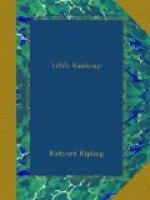‘Even so,’ said Little Tobrah gravely. ’She who was found dead in the well. It befel upon a time, which is not in my memory, that the sickness came to the village where our oil-press stood, and first my sister was smitten as to her eyes, and went without sight, for it was mata—the smallpox. Thereafter, my father and my mother died of that same sickness, so we were alone—my brother who had twelve years, I who had eight, and the sister who could not see. Yet were there the bullock and the oil-press remaining, and we made shift to press the oil as before. But Surjun Dass, the grain-seller, cheated us in his dealings; and it was always a stubborn bullock to drive. We put marigold flowers for the Gods upon the neck of the bullock, and upon the great grinding-beam that rose through the roof; but we gained nothing thereby, and Surjun Dass was a hard man.’
‘Bapri-bap,’ muttered the grooms’ wives, ’to cheat a child so! But we know what the bunnia-folk are, sisters.’
’The press was an old press, and we were not strong men—my brother and I; nor could we fix the neck of the beam firmly in the shackle.’
‘Nay, indeed,’ said the gorgeously-clad wife of the Head Groom, joining the circle. ’That is a strong man’s work. When I was a maid in my father’s house——’
‘Peace, woman,’ said the Head Groom. ‘Go on, boy.’
‘It is nothing,’ said Little Tobrah. ’The big beam tore down the roof upon a day which is not in my memory, and with the roof fell much of the hinder wall, and both together upon our bullock, whose back was broken. Thus we had neither home, nor press, nor bullock—my brother, myself, and the sister who was blind. We went crying away from that place, hand-in-hand, across the fields; and our money was seven annas and six pie. There was a famine in the land. I do not know the name of the land. So, on a night when we were sleeping, my brother took the five annas that remained to us and ran away. I do not know whither he went. The curse of my father be upon him. But I and the sister begged food in the villages, and there was none to give. Only all men said—“Go to the Englishmen and they will give.” I did not know what the Englishmen were; but they said that they were white, living in tents. I went forward; but I cannot say whither I went, and there was no more food for myself or the sister. And upon a hot night, she weeping and calling for food, we came to a well, and I bade her sit upon the kerb, and thrust her in, for, in truth, she could not see; and it is better to die than to starve.’
‘Ai! Ahi!’ wailed the grooms’ wives in chorus; ’he thrust her in, for it is better to die than to starve!’
’I would have thrown myself in also, but that she was not dead and called to me from the bottom of the well, and I was afraid and ran. And one came out of the crops saying that I had killed her and defiled the well, and they took me before an Englishman, white and terrible, living in a tent, and me he sent here. But there were no witnesses, and it is better to die than to starve. She, furthermore, could not see with her eyes, and was but a little child.’




